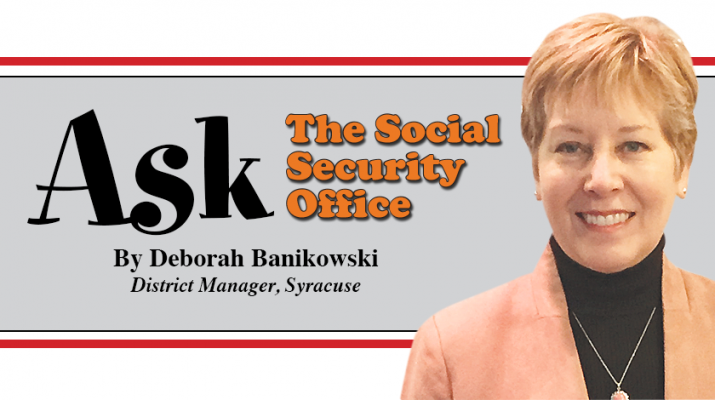By Deborah Banikowski
District Manager, Syracuse
Affordable medical coverage is something everyone wants, especially as people age. Luckily, our nation has safeguards for workers as they get older. Millions of people rely on Medicare, and it can be part of your health insurance plan when you retire.
Medicare is available for people age 65 or older, as well as younger people who have received Social Security disability benefits for 24 months, and people with certain specific diseases. Two parts of Medicare are Part A (hospital insurance) and Part B (Medicare insurance). You are eligible for premium-free Part A if you are age 65 or older and you or your spouse worked and paid Medicare taxes for at least 10 years. Part B usually requires a monthly premium payment.
You can apply online for Medicare even if you are not ready to retire. Use our online application to sign up. It takes less than 10 minutes. In most cases, once your application is submitted electronically, you’re done. There are no forms to sign and usually no documentation is required. Social Security will process your application and contact you if we need more information. Otherwise, you’ll receive your Medicare card in the mail.
You can sign up for Medicare at www.socialsecurity.gov/benefits/medicare.
If you don’t sign up for Medicare during your initial enrollment window that begins three months before the birthday that you reach age 65 and ends three months after that birthday, you’ll face a 10 percent increase in your Part B premiums for every year-long period you’re eligible for coverage but don’t enroll. You may not have to pay the penalty if you qualify for a special enrollment period (SEP). If you are 65 or older and covered under a group health plan, either from your own or your spouse’s current employment, you may have a special enrollment period during which you can sign up for Medicare Part B. This means that you may delay enrolling in Part B without having to wait for a general enrollment period and without paying the lifetime penalty for late enrollment. Additional rules and limits apply, so if you think a special enrollment period may apply to you, read our Medicare publication at www.socialsecurity.gov/pubs/, and visit the Centers for Medicare and Medicaid Services at Medicare.gov for more information.
Health and drug costs not covered by Medicare can have a big impact on how much you spend each year. You can also estimate Medicare costs using an online tool at www.medicare.gov/oopc/.
Keeping your healthcare costs down allows you to use your retirement income on other things that you can enjoy. Social Security is here to help you plan a long and happy retirement at www.socialsecurity.gov.
Q&A
Q: I applied for disability benefits, but was denied. I’d like to appeal. Can I do it online?
A: Yes. In fact, the best way to file a Social Security appeal is online. Our online appeal process is convenient and secure. Just go to www.socialsecurity.gov/disability/appeal to appeal the decision. For people who don’t have access to the internet, you can call us at 1-800-772-1213 (TTY 1-800-325-0778) to schedule an appointment to visit your local Social Security office to file your appeal.
Q: What is the purpose of Supplemental Security Income, or SSI?
A: The purpose of SSI is to help aged, blind, and disabled people who have little income and few resources to support themselves. It provides financial assistance to meet basic needs for food, clothing, and shelter. You can receive SSI even if you have not worked and paid into Social Security. SSI is a federal income supplement program funded by general tax revenues (not Social Security taxes). Find out more at www.socialsecurity.gov/ssi.
Q: I worked the first half of the year, but plan to retire this month. Will Social Security count the amount I earn for this year when I retire?
A: Yes. If you retire mid-year, we count your earnings for the entire year. We have a special “earnings test” rule we apply to annual earnings, usually in the first year of retirement. Under this rule, you get a full payment for any whole month we consider you retired regardless of your yearly earnings. We consider you retired during any month your earnings are below the monthly earnings limit, or if you have not performed substantial services in self-employment. We do not consider income earned, beginning with the month you reach full retirement age. Learn more about the earnings test rule at www.socialsecurity.gov/retire2/rule.htm.

